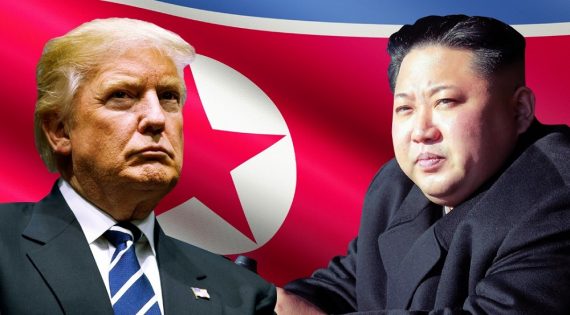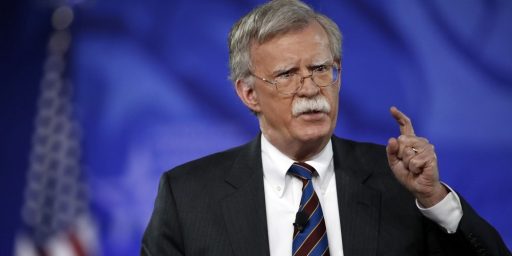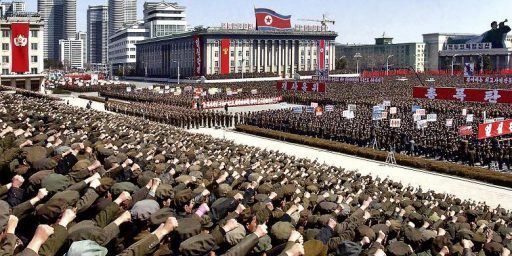Bolton Sees Libya As Model, North Korea Likely Sees It As a Warning
The United States is apparently looking to Libya as a guide for upcoming talks with North Korea. The DPRK most likely sees the fate of that nation and its leader as a warning.

Yesterday in appearances on two Sunday morning shows, National Security Adviser John Bolton suggested that the United States is anticipating that the issue of North Korean denuclearization would follow the model laid out in dealings with Libya during the George W. Bush Administration:
President Trump’s new national security adviser, John Bolton, floated the idea of using the “Libya model” to denuclearize the Korean peninsula on Sunday, despite the fact that North Korea has previously cited Libya’s disarmament and subsequent destabilization as a reason to distrust the U.S.
Bolton was referring to the process by which the U.S. and its allies relieved Libya of its weapons of mass destruction starting in 2003. Appearing on Fox News Sunday and CBS News’ Face the Nation on Sunday, he explained that the White House has “very much in mind the Libya model from 2003, 2004,” a process which moved quickly after the U.S. was able to confirm Libyan dictator Muammar Qaddafi’s intentions and verify his regime’s full disclosure about their weapons programs. Like in Libya, the U.S. will look to dismantle North Korea’s nuclear, chemical, and biological weapon programs, he added.
As Peter Baker notes in The New York Times, though, notes that it’s likely that the North Koreans learned a far different lesson from what happened in Libya than Bolton apparently has:
WASHINGTON — When John R. Bolton looks at North Korea, he sees Libya. It is not a perfect comparison, he acknowledges, but if there is a model for how to peacefully rid a hostile dictatorial state of its nuclear program, he points to the disarming of Libya some 15 years ago.
It is easy to grasp why the United States views that as a success. A ruthless despot with a history of sponsoring terrorism surrendered his efforts to build a catastrophic weapon. But that despot, Col. Muammar el-Qaddafi, might not see it as such a good deal today. No one will ever know for sure because he is dead. Which is why North Korea might not find it such an uplifting model either.
The divergent vantage points on Libya may be instructive to understand how President Trump and Mr. Bolton, his new national security adviser, are approaching the coming talks with the North Korean leader, Kim Jong-un. The divide also underscores the challenges Mr. Trump and Mr. Bolton face: As they seek to replicate the feat of eliminating Libya’s nuclear program, analysts said, they could face distrust because of the unexpected turn of events that led to Colonel Qaddafi’s demise.
Mr. Bolton, who served under President George W. Bush, views Libya through the experience of those heady days in 2003 and 2004 when Colonel Qaddafi agreed to transfer his nuclear equipment to a facility in Tennessee. Mr. Kim may remember what came later, when President Barack Obama and European allies launched military action against Libya in 2011 to prevent a threatened massacre of civilians, in the process enabling rebels not only to topple Colonel Qaddafi but also to hunt him down and kill him.
Would Colonel Qaddafi have given up that nuclear weapons program if he had known what was to come? Would the United States and Europe have used force against a nuclear-armed country? Not likely. And therein lies the rub with North Korea. Mr. Kim and his father built a nuclear arsenal for the very purpose of ensuring the security of their state against the kind of intervention that happened in Libya, which is why North Korea has insisted the United States promise not to invade as part of any deal.
“I heard directly from the Chinese that the Libyan model did not inspire confidence in Pyongyang,” said Antony J. Blinken, a deputy secretary of state under Mr. Obama. “I would be very concerned that the combination of Libya and then Trump tearing up the Iran agreement sends exactly the wrong message to Kim Jong-un and undermines whatever hope exists for negotiations.”
Mr. Bolton raised the Libya example in weekend interviews on “Face the Nation” on CBS and “Fox News Sunday,” his first television appearances since becoming national security adviser early this month.
“We have very much in mind the Libya model from 2003, 2004,” he said on Fox. “There are obviously differences. The Libyan program was much smaller, but that was basically the agreement that we made.”
The most important comparison, he said, would be testing North Korea to see if it had genuinely made an unqualified determination to abandon its nuclear weapons. “It would be a manifestation of the strategic decision to give up nuclear weapons,” Mr. Bolton said on CBS. “Doesn’t have to be the same as Libya, but it’s got to be something concrete and tangible. It may be that Kim Jong-un has some ideas and we should hear him out.”
In the history of the atomic age, only four countries have voluntarily given up nuclear weapons. South Africa ended its secret nuclear program in 1989, destroying a half-dozen bombs. Ukraine, Belarus and Kazakhstan all gave up the nuclear weapons that were stationed on their territory after the Soviet Union collapsed in 1991 and they became independent nations.
But Ukraine has found reason for second-guessing. The Budapest Memorandum that sealed its denuclearization in 1994 included promises by the United States, Britain and Russia to respect the country’s sovereignty and borders. But in 2014, Russia annexed Crimea and supported Russian separatists in eastern Ukraine. Given that, a member of Ukraine’s Parliament said at the time that “now there’s a strong sentiment in Ukraine that we made a big mistake” in giving up its weapons.
Others like Brazil and Taiwan sought nuclear weapons but abandoned the efforts short of building bombs. Iran was not known to have weapons but did have a nuclear program that seemed intended to develop them when it signed an agreement with Mr. Obama’s administration in 2015 to give up its program — the same agreement Mr. Trump has excoriated and threatened to rip up by May 12.
Similarly, Libya did not have nuclear weapons but had a program to develop them when it changed course in 2003. Colonel Qaddafi initiated secret negotiations with the Bush administration and the British to dismantle his program in exchange for easing international sanctions.
The decision reflected years of effort to end the country’s isolation. But the key agreement came just days after Iraq’s deposed leader, Saddam Hussein, was found in a spider hole in Iraq after an American invasion that had been justified as an effort to rid a dangerous regime of weapons of mass destruction. Colonel Qaddafi signaled that he did not intend to suffer the same fate.
As Steven Taylor noted yesterday, there is plenty of reason to be skeptical about what the coming weeks, months, and years may portend with respect to North Korea, the Korean Peninsula, and the United States. One of the primary reasons for that is that, notwithstanding all of the media reports, it seems rather clear that what the United States means by “denuclearization” is far different from what the North Koreans mean. Additionally, it’s being reported in at least some circles that the Trump Administration is insisting that the North Koreans agree in advance that the idea of the talks ultimately leading to the DPRK not only foregoing from testing nuclear weapons and ballistic missiles but also that it gives up whatever weapons it has developed. The North Koreans, on the other hand, seem to view denuclearization as including the withdrawal of American forces from South Korea and the removal of South Korea, and possibly Japan, from the protection provided by the U.S. “nuclear umbrella.” For reasons that are more related to concerns about Chinese influence in the region than the Kim regime, the United States is unlikely to agree to this kind of condition. Given that, the prospects for an agreement of any kind are not nearly as sunny as some of the recent press reports would seem to make it out to be.
This would seem to be especially true if Bolton is speaking for the Administration when he says that we should look to Libya as the model for how to deal with North Korea, and presumably he is. As Baker notes in his analysis and I’ve noted myself before, the story of what happened in Libya, as well as other nations, sends a clear signal to the DPRK that I don’t think most Americans understand.
In the case of Libya, which gave up its nuclear and WMD research efforts in the wake of the Iraq War in what the leadership at the time clearly believed would be a move that would help ensure their long-term survival. Instead of survival, though, Libya ended up finding itself the target of the United States, the United Kingdom, and France in a civil war that ended with the collapse of the Gaddafi regime and the death of Gaddafi himself. The North Koreans most likely learned a similar lesson from what happened to Saddam Hussein, another autocratic leader who gave up his weapons of mass destruction only to see his country invaded and him being forced into hiding and eventual capture, after which he faced a trial and ultimately execution.
On the other side of the table, the North Koreans are no doubt aware of the fate of other nations that have pursued nuclear weapons programs notwithstanding the objections of the international community. With Indian and Pakistan, for example, we have two nations that pursuant nuclear weapons development notwithstanding international pressure and which both now possess what is likely a sufficient nuclear deterrent to ensure their survival. Finally, of course, we have the Joint Comprehensive Plan Of Action (JCPOA) and the manner in which the Iranians were treated. Rather than being attacked like the Libyan and Iraqi governments, the Iranians obtained an international agreement that allowed them to largely escape a crippling sanctions regime and, to at least some degree of the Islamic Republic back into the world community from which North Korea has been excluded for the better part of the time it has existed. Notwithstanding the fact that the Trump Administration and much of the news media likes to paint the Kim regime, and Kim Jong-Un himself as unhinged, their actions to date indicate quite the opposite and that they are very much acting in quite a rational manner. Given that, the fact that the United States is looking to a model that led to the leader of an authoritarian regime being killed by a mob and his body dragged through the streets is likely not going to go over very well in Pyongyang






Well, it is Bolton. One can be confident of one thing – loud-mouthed autistic assertion as policy.
However, one can suspect he’s not quite so oblivious and self-regarding as to not know how the Libyan analogy would be construed by North Korea. Pre-blowing up any deal would be quite his style.
I’m not sure how much sway Bolton has. Trump seldom listens to anyone but his senior advisors, Steve Doocy and Sean Hannity.
My problem with all of this talk is that it ignores what I believe to be true, that the US does not necessarily profit strategically from peace on the Korean peninsula. I think our strategic interest (as currently framed) in the area is containment of China. We have powerful forces in Japan, Taiwan, Philippines and South Korea. Look at a map and that’s a pretty nice encirclement of China’s coast.
I believe if there’s a peace deal between North and South it will only be a matter of time before the Left in SK starts applying pressure for a draw-down. I don’t know anything about domestic SK politics, so no idea how that will play out, but no matter how you look at it, the rationale for US presence will be dramatically weakened by peace, especially given the resonance with Trump’s isolationism.
The Chinese will be the big winners in both short and long-term. A Kim regime that has been diplomatically integrated will get a flood of Chinese business. The Chinese are already facing possible labor shortages and rising labor costs – North Korea could be their Mexico.
The Philippine base is already hostage to Duterte’s whims, if we draw down in SK, how long before Taiwan sees the handwriting on the wall and decides it’s time to make a two-party deal with the mainland? If you reduce it to up/down arrows, China’s influence is going up, ours is going down, and our containment strategy will suffer, unless Vietnam decides to step into the breach and let us build a nice naval base in Haiphong harbor. (Alert the Irony Gods.)
Is this a net bad for us? It depends on how you see the US going forward. Are we the sole superpower, the great defender of the status quo? Or are we coming home, America, trending isolationist? I don’t believe we have a zero sum game, I’m not convinced that containing China is absolutely vital (or possible long-term), any more than I think it’s a tragedy that Russia now ‘owns’ Syria. But we should be clear that peace between the Koreas will almost inevitably result in less US influence in Asia, especially if we stay out of TPP.
@michael reynolds:
Didn’t the US abandon its bases in the Philippines in the early 90s?
Other than that, the Orange Clown doesn’t seem to know any other way to deal with China than tariffs.
Kim needs money. The US and SK have the capacity to either give money or create circumstances in which money can come into the country. Expect to see some sort of attempt to reduce or eliminate the sanctions and/or some kind of technical aid in exploiting NK natural resources in return for promises from NK of better, safer times to come. It is possible that Kim can persuade the US and SK to dispense with the annual “retaliatory invasion of NK” exercise considering that he has already gotten a postponement for this year, but I don’t think so personally. Expect Trump to brag about how whatever happens, it is all because he is a winner and the legit best negotiator (evah!). Expect to see NK test additional weapons and missiles as the need (for either security or economic reasons) demands. And expect the UN to become angry for the howevermany-eth time over those tests.
And expect the US and China to be blamed by both NK and SK if the negotiations lead nowhere. Don’t expect a peace treaty to emerge from these talks, it’s not reasonable and may not fit the needs of either NK or SK, both of which, I expect, would like to remove the stigma of “client nation” from their respective resumes, but also gain advantage relative to China by the US presence on the peninsula. I don’t expect China to apply for the position of global hegemon anytime soon, but I do expect China to continue to work toward being the East Asian hegemon and go to source for relief from perceived pressures of Western (read US) overreach, of which there will be continued examples for the next 3-6 years due to the current occupant of 1600 Pennsylvania Avenue.
One of the things that irritates me the most is peoples’ inability to learn. I initially, and stupidly, supported the Iraq war. The one good thing that came out of it was that Libya gave up it’s nuclear program, and, as I recall, it was sent to Oak Ridge, TN. Attacking Libya a few years ago taught the wrong lesson. We said we would leave them alone if they did what we wanted. We really screwed up by supporting an attack on them.
The North Koreans committed to a process for a “nuclear-free” penninsula in the Panmunjon Declaration and to de-militarize the 38th parallel, in addition to a host of other economic and political joint ventures. Furthermore President Moon has made explicit there will be no attack by the United States upon North Korea without prior approval by the South Korean government.
It appears, and I hope this is the case, that South Koreans are now rejecting their role as an American colonial possession and are determined to forge a peace with or without approval of Washington’s foreign policy-psychopath class.
Well, what we know is there wouldn’t even be a glimmer of the hope we are now seeing with North Korea if Hillary had been installed in the Presidency.
She and Obama went back on the US’s word with Libya and she danced on the grave. BTW, why do we no longer hear about RTP after Libya turned into such a mess?
@JKB: I don’t see a glimmer yet. Trump and his team are exceedingly inexperienced, and Trump himself does not care at all about the security of South Korea or even the United States. The odds of his administration successfully negotiating permanent peace are low.
If that is indeed the case it means hope rests entirely on North and South Korea, the assumption both are acting in good faith and their willingness to tell Washington to piss off.
@michael reynolds: I’d be more concerned with Japan than China. They have serious security concerns involved, and they may decide it’s time to cease pretending they aren’t a Great Power should there be a process of Korean unification. Particularly if that unification includes continued nuclear capability.
@JKB: I know that in the article above John Bolton is suggesting Libya as a model. I don’t think he is currently employed by Clinton or Obama? Maybe pointing at them is even a stupider distraction than normal?